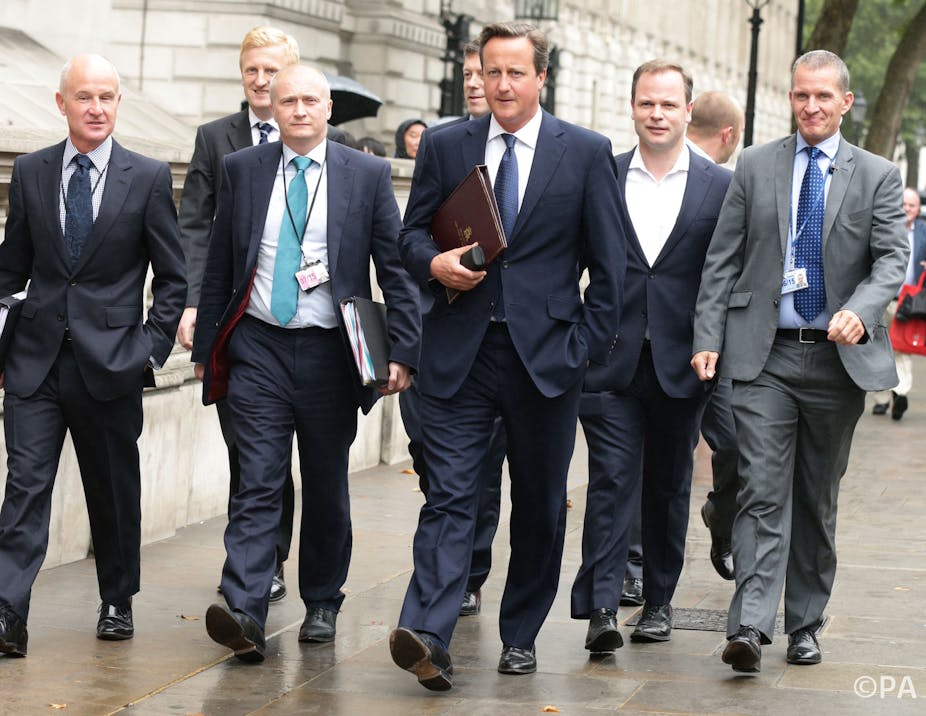After weeks of speculation, the UK government has played its hand, revealing the measures it is taking to confront what is apparently “the greatest and deepest terrorist threat” the UK has ever faced.
That is what it wants us to think anyway, even though David Cameron’s speech to parliament on the matter was noticeably devoid of any meaningful detail. We can make a number of observations about the proposals though, particularly in relation to how they may work and what problems the government might have implementing them.
Withdrawing passports
As he announced his plans, Cameron noted that the government already has the power under the Royal Prerogative to withhold a passport and prevent somebody travelling if it is in the public interest to do so. Since revising this rule back in April 2013, Home Secretary Theresa May has exercised this power 23 times.
The right to withdraw passports is currently being tested in the courts and if they rule against the Home Secretary, Cameron says the government will introduce legislative changes. But on what grounds could such powers be challenged?
Jack Straw faced similar calls back in 2000 to withdraw passports from suspected football hooligans to prevent them from travelling to the European football championships in Belgium and the Netherlands. Straw refused on the grounds that such a severe sanction should only be used against a citizen if they have actually been convicted of an offence. The current government doesn’t appear to uphold such high standards and it remains to be seen if the courts will either.
We’ve also learnt that police at border controls will have discretionary powers to withhold passports. Such an intrusive power would need to have numerous safeguards attached to it in order to prevent it from being abused.
Even with safeguards, we can’t be sure that the power won’t be abused. Terrorism laws already give border police the right to hold suspects for up to nine hours. Only a year ago we saw what this means in practice when David Miranda, partner of Guardian journalist Glenn Greenwald, was detained at Heathrow airport on suspicion of carrying leaked documents for whistle-blower Edward Snowden.
Temporary measures?
The power to strip individuals of their UK passports and make them stateless is one that would be, for very good reason, contrary to international law. Cameron, however, stated that the government was inquiring into the possibility of temporarily denying British citizens re-entry into the UK.
It is hard to see how being denied entry to the state of which you are a citizen does not amount to making you stateless, however Cameron wants to couch it.
And reassurances that these measures would be temporary are hardly comforting either. When it comes to terrorism legislation, there is a notable propensity for temporary actions to be perpetuated or repeatedly renewed. If this were to happen to British citizens denied re-entry, they are effectively being left in limbo. There would have to be explicit time-limits in place to make these proposals even marginally palatable from a human rights perspective.
Don’t move
The other headline change announced by Cameron is to Terrorism Prevention and Investigation Measures. Most notably, these changes will now include tighter constraints on movement although, again, significant detail is lacking; specifically, whether such changes will involve the reintroduction of controversial forced relocation powers.
An independent review of these policies, while acknowledging the effectiveness of tighter controls on suspects’ movements, equally stressed the damaging effects these restrictions can have on a person and how stigmatising individuals may be counter-productive. The report also suggested that those subject to these restraints should be helped to find work, housing and training but it doesn’t look likely that the government will be following that particular suggestion.
We may well soon be hearing further warnings from the Muslim Council of Britain that these measures will only marginalise young people further and drive them towards extremism.
Safe at last?
So after the announcement can you sleep more peacefully? Only if you are easily reassured by vague promises.
Details should be revealed in the coming weeks but it is still difficult to escape the feeling that these changes are being rushed through, capitalising on a climate of fear, with politicians seeking to be seen to be doing something.
We can hope that disagreements within the coalition will allow for deeper consideration in the meantime at least. Rumours of disaffected Lib Dems are appearing, and indeed the lack of detail perhaps suggests the two governing parties are yet to find a middle ground on this issue.
It is possible that these measures may not get such an easy ride through parliament if that is the case. We should hope for this. It’s difficult to see how temporarily denying an individual the right to enter the UK will somehow de-radicalise them or make them less of a threat to the UK. At best, many of these measures appear to be the epitome of short-sighted thinking. At worst, they are counter-productive and amount to rendering an individual stateless.

